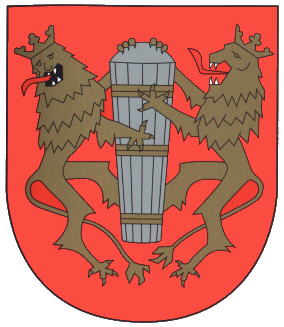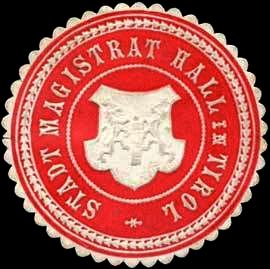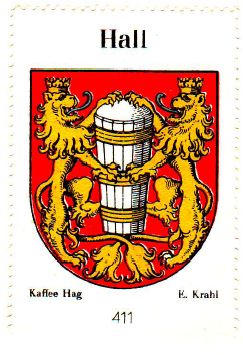Hall in Tirol: Difference between revisions
Jump to navigation
Jump to search
Knorrepoes (talk | contribs) m (Text replacement - ".jpg|center]] <br/>Seal from around 1900" to ".jpg|center|Seal of {{PAGENAME}}]] <br/>Seal from around 1900") |
Knorrepoes (talk | contribs) m (Text replacement - ".hagat.jpg|center]]" to ".hagat.jpg|center|Wappen von {{PAGENAME}}]]") |
||
| Line 17: | Line 17: | ||
{|align="center" | {|align="center" | ||
|align="center"|[[File:halltz1.jpg|center|Seal of {{PAGENAME}}]] <br/>Seal from around 1900 | |align="center"|[[File:halltz1.jpg|center|Seal of {{PAGENAME}}]] <br/>Seal from around 1900 | ||
|align="center"|[[File:hall.hagat.jpg|center]] <br/>The arms in the [[Kaffee Hag : Die Wappen der Republik Oesterreich|Coffee Hag album]] +/- 1932 | |align="center"|[[File:hall.hagat.jpg|center|Wappen von {{PAGENAME}}]] <br/>The arms in the [[Kaffee Hag : Die Wappen der Republik Oesterreich|Coffee Hag album]] +/- 1932 | ||
|} | |} | ||
Revision as of 17:50, 29 October 2016
HALL IN TIROL
State : Tirol
District : Innsbruck-Land
Official blazon
Origin/meaning
The salt barrel in the arms appears already on the oldest seal of the city, dating from 1316. The barrel symbolises the importance of salt mining in the area.
The lions were granted on August 22, 1501 by King Maximilian I. The meaning of the lions is not clear.
| Seal from around 1900 |
The arms in the Coffee Hag album +/- 1932 |
Contact and Support
Partners:
Your logo here ?
Contact us
© since 1995, Heraldry of the World, Ralf Hartemink 
Index of the site
Literature : Köfler and Beimrohr, 1995












